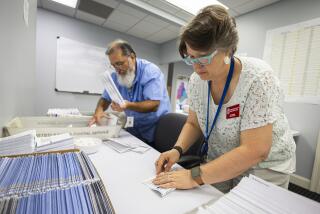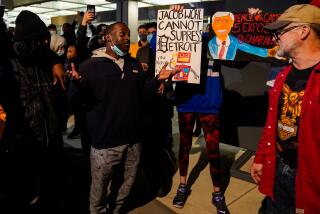Afghans plan polling changes
- Share via
KABUL, AFGHANISTAN — Afghan authorities plan to close thousands of polling stations and hire new poll workers to discourage the fraud that tarnished the August presidential election and forced a runoff set for Nov. 7, U.N. officials said Wednesday.
President Hamid Karzai’s rival, former Foreign Minister Abdullah Abdullah, announced Wednesday that he was preparing for the runoff election, a day after Karzai acknowledged under intense U.S. pressure that he fell short of the 50% threshold needed for victory in the Aug. 20 vote.
U.N.-backed auditors threw out nearly a third of Karzai’s votes because of fraud.
In Washington, U.S. officials said a power-sharing arrangement between Karzai and Abdullah to avoid a runoff was still possible, although it would be up to the Afghans.
Afghan officials are scrambling to organize a new election in the face of a growing Taliban insurgency and ahead of the advent of winter, which begins in much of the country around the middle of November.
The Afghan Independent Election Commission, dominated by Karzai supporters, is under enormous pressure to avoid a repeat of the massive fraud, which discredited the government and threatened to undermine public support for the Afghan war in the United States and Western European countries that provide most of the foreign troops.
U.N. Secretary-General Ban Ki-moon has said it would be a “huge challenge” to hold another election without a repeat of large-scale fraud.
The U.N. has set aside more than $20 million to support the poll, according to the U.N. spokesman in Kabul, Aleem Siddique.
In an effort to tamp down cheating, officials will cut about 7,000 of the 24,000 polling stations they set up for the August ballot. Some of those stations were in areas too dangerous to protect. Others never opened, enabling corrupt officials to stuff the ballot boxes.
About 200 of the 2,950 district election coordinators will be replaced following complaints of misconduct leveled by candidates or observers, the U.N. said.
More to Read
Sign up for Essential California
The most important California stories and recommendations in your inbox every morning.
You may occasionally receive promotional content from the Los Angeles Times.













